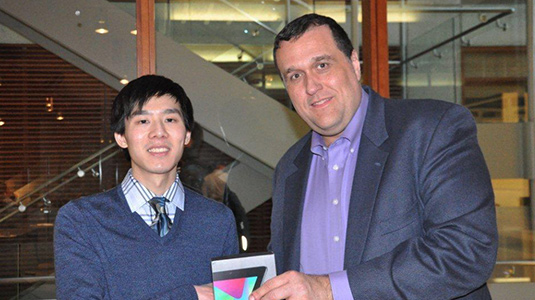Master of Engineering Management Students Compete in Business Simulation
Students learn business management in inter-school competition

Students in McCormick’s Master of Engineering Management (MEM) program recently competed in a cross-school business simulation competition with fellow engineering management students from peer schools.
Organized by Northwestern at a Master of Engineering Management Programs Consortium (MEMPC) meeting, the four-week competition brought together master’s students from Northwestern, Cornell, Dartmouth, Duke, MIT, and Stanford.
Five teams — each composed of students from different schools — were challenged to manage a hypothetical automotive company, identifying target consumer markets and competing against one another for those markets. Using a set amount of capital, participants developed plans for research and development, product development, marketing, manufacturing, and distribution. The contest culminated in team presentations via webinar.
“The MEMPC competition is distinctive in that it is a multi-campus competition, between peer schools, using a business simulation as the basis,” said Mark Werwath, director of Northwestern’s MEM program. “The cross-school teaming requires teams to work in a geographically distributed way, which better emulates the real-world scenarios in global corporations today. This also maximizes the chances for student teams to develop more robust social networks.”
“Teamwork was the crucial factor here,” added Sue Fox, associate director of Northwestern’s MEM program.
“The great thing about a simulation is that it provides a practice-field for making business decisions in a 'laboratory' environment," said David Semb, a Northwestern adjunct professor and partner at PriSim Business War Games Inc., a business simulation and training company, who helped organize the competition. "In today’s business world, getting that chance to experiment and make realistic decisions helps build the business acumen you need in the real-world.”
Teams also had significant input into their scoring process. Early in the competition, student teams established their “balanced scorecard,” a performance management tool frequently used in business. Later, each team was objectively measured against that scorecard.
James Du, who represented Northwestern on the winning team, said he used many of the concepts he had learned in two recent MEM courses, Organizing for Innovation and Creating and Sharing Knowledge.
“My team worked extremely well together, and everyone bought into the organizational framework that we created,” Du said. “I'm actually most proud of the innovations that came from team members whom I originally disagreed with. I learned a lot by going through the process of tacitly and explicitly applying what I learned from my courses in real time."
Other members of the winning team were Matt Rice (Dartmouth), Terene Teo (MIT), Joanna Clark (Duke), Chi Hung Chong (Stanford), and Penmatsa Sruthi (Cornell). Each received a Nexus 7 Wifi Tablet as a prize.
The MEMPC is a small group of highly selective and forward-thinking professional graduate engineering management programs dedicated to maintaining outstanding, industry-relevant programs. Member programs share best practices and curricular innovations, provide a national network of MEM students, and promote the benefits of an MEM dregree to business and industry through joint outreach ventures.
Northwestern’s MEM program is designed for engineering and science professionals who want to develop core management and leadership skills while staying on the cutting edge of technology. With both full- and part-time options, the curriculum empowers engineers to communicate in the language of business and to move from thinking tactically to thinking strategically.